


A lesson in understanding injustice and overcoming adversity
By
Dennis Fischer
2012 Dennis Fischer ®
All rights reserved
Dedicated to Linda Talbert
A wonderful Teacher, a devoted Christian, and a passionate Golfer
"For our light affliction, which is but for a moment, works for us a far
more exceeding and eternal weight of glory."
Dear Friends,
One of the most memorable experiences I had growing up was playing golf with my father. My dad was an exceptional player winning numerous club and amateur championships. He played like a pro and his scores reflected it.
My dad introduced me to the game when I was very young and I took to it like fish to water. It is such a GREAT game. I can still vividly remember going with him to a local driving range where he would meet up with some of the area’s top professionals. For hours they would take turns hitting ball after ball with uncanny accuracy. Sometimes they would have competitions to see who could hit a ball the farthest with one after another easily eclipsing 300 yards. Then they would pick a target and see who could get the closest.
I was about nine years old when I became a regular member of the group. They even invited me to join their contests and somehow fixed it so I would always win. During the summer I would often go to the range by myself and would invariably run into my dad’s buddies. Even though my father was at work these “grown-ups” made a real fuss over me. They would invite me to sit with them and join in the discussion of the day. They would even spring for a cheese burger and a soft drink. They would also get me a bucket of balls and take turns giving me lessons.

Mike Austin
February 17, 1910 - November 23, 2005
Regarded at the time as the longest hitter in golf.
In 1974, while playing in the U.S. National Seniors Championship
Mike drove a ball an astonishing 515 yards. He became a regular
member of the group and was wonderfully gracious to me.
The last time I saw him was at my father’s funeral in 1993.
I suspect I spent literally thousands of hours at courses and ranges. And I would bet that my dad and I played hundreds of rounds together. It was a regular weekend activity for us—and might I say a source of great father–son moments.
Some Observations on Golf
At this point I would like to make a few observations about golf. First it is a unique game in which the player with the fewest points wins. Additionally, it requires a high level of integrity because players are actually required to call penalties on themselves. Therefore, if a player inadvertently violates a rule, even though it may have no impact on the game, they are required to advise an official in order to be assessed a penalty. Failure to do so would tarnish the game and was unthinkable. Imagine if this approach took place in other sports. For example: Imagine a baseball player informing an umpire that he failed to touch third base on his way to scoring the winning run. That too is unthinkable.

The Claret Jug
Awarded to the winner of the British Open Golf Championship
In golf it is not about securing an advantage over an opponent but rather mastering the course, the elements (weather) and one’s own skill. However, one thing that make the game so unique is that it also demands that players comport themselves with dignity and respect for both the game and fellow players. In times past it has even been referred to as a “gentleman’s game.” And although golfers compete with other golfers they can do nothing to impede their opponents’ attempts to excel. You don’t guard your opponent. There are no full court presses or zone defenses in golf. Even spectators are required to show respect for all the players.
But why mention golf in a booklet about faith and the Christian walk? And what possible application does this game carry for God’s people? The answer lies in one of golf’s rules. Some even regard it as its cardinal rule—one that in many respects defines the game. The rule is simple but very telling.
“Play it where it lies.”

The actual rule reads as follows
13-1. The ball must be played as it lies, except as otherwise provided in the Rules.
13-2. A player must not improve or allow to be improved:
. the position or lie of his ball,
. the area of his intended stance or swing,
. his line of play or a reasonable extension of that line beyond the hole or
. the area in which he is to drop or place a ball,
by any of the following actions:
. pressing a club on the ground,
. moving, bending or breaking anything growing or fixed (including immovable obstructions and objects defining out of bounds
. creating or eliminating irregularities of surface,
. removing or pressing down sand, loose soil, replaced divots or other cut turf placed in position, or
. removing dew, frost or water.
In essence, this rule is stating that a player may not move his or her ball in order to improve its position. Furthermore, so explicit is this rule that once a player prepares to hit a shot by grounding his club and the ball moves, even without being touched, the player is penalized.
Now it would seem that such a strict rule would virtually assure the fairness of every match. In other words, good shots would always be rewarded while poor shorts would always be penalized.
However, this is not necessarily the case.
To illustrate this point consider the following:
The Example of Two Drives
Imagine that two players are in a very close match as they arrive at the last hole. Player “A” drives his ball 300 yards right down the middle of the fairway. Player “B” then drives his ball very poorly. He hit it way to the left into the midst of a huge gathering of trees. When the players arrive at their respective shots player “A” discovers that his ball has become imbedded in some soft earth making it impossible to advance it more than a few yards. Meanwhile, player “B” discovers that his ball has landed on a small piece of grass. Additionally there is a perfect opening to the green. As it turned out his position couldn’t have been better. The point here is that despite any attempts to the contrary golf can be very unfair.
But is golf supposed to be fair?
Well according to one of its legends, the answer is no.
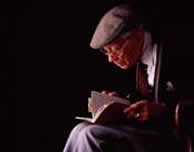
Harvey Morrison Penick
October 23,1904 - April 2, 1995
Harvey Penick was considered one of the greatest golf teachers who ever lived. Some of the finest professionals in the world have sought his wisdom and thrived because of it. One such player was Ben Crenshaw.

A Masters' Moment
One week after the death of Mr. Penick, Crenshaw, who served as a pall bearer at the funeral, bent over sobbing after putting out to win the 1995 Masters Golf championship, one of the most prestigious tournaments in the world. This moment is universally recognized as one of the most touching in the history of sport. For his efforts Crenshaw was awarded $396,000, the famous Masters' "green jacket" and the championship trophy. But on that day his mind was on his beloved mentor.

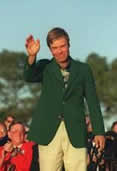
Harvey Penick on the Fairness of Golf
Here is an observation Mr. Penick made about the game he so deeply loved and the beauty of rule 13.
“Golf is not about fairness. The ball is to be played where it sits. There are benefits to this approach. In golf, as in life, obstacles are placed in our path. In overcoming these roadblocks our greatest triumphs occur.
There are no good or bad lies only what is. When we see things without judgment or complaint, we provide ourselves with the greatest chance for success. It doesn’t guarantee success but it does guarantee us the opportunity to give our best.”
Illustrating Mr. Penick’s Point
I remember playing one particular round with my dad which illustrates Mr. Penick's point. It was at a private club in Southern California. The twelfth hole was a long and narrow par 5. My dad uncharacteristically pulled his drive to the left leaving him an impossible second shot. The ball came to rest on gravel in the midst of some trees. There was a small opening in the trees, however, the position of the ball (did I mention the gravel) made any thought of attacking the green seem foolish. At that point, my dad explained to me that it is situations like this that made the game so great because it brought out real skill in a serious golfer. He then pulled a custom made wood (a driver with the loft of a three wood) he called "Thing," out of his bag and swung launching his ball toward the green. He then immediately turned to me without watching its flight and said, "That should do it." His shot landed on the green where he proceeded to make his putt for an eagle three. It is the greatest shot I have ever seen. I believe he shot a 68 that day. I know he broke par.
"Golf is never a fair game and was never meant to be."
|
The Question of the Day
This now brings us to the question of the day. Is it possible that like golf, life itself is NOT about fairness? And is it possible that when we become angry and even bitter over life’s inequities and injustices, we deprive ourselves of an opportunity to give our best.
A Reality of Life
In the world today, good people, including sincere God fearing believers, have found themselves on the wrong end of experiences that have been totally absent of fairness. Consider just a few examples:
I’ve known true Bible believing Christians who have had a child violently murdered.
Where is the fairness in that?
A few years ago a gunman entered a Church of God congregation during Sabbath services and opened fire killing several people including the pastor and his seventeen year old son.
Where is the fairness in that?
I am sure many of us have known people whose children have suffered catastrophic diseases. How would you like to be a parent whose child is battling inoperable cancer?
Where is the fairness in that?
I once knew a church pastor who awoke to find that his infant child had died in his crib. He was inconsolable.
Where is the fairness in that?
I have known good people whose lives were cut short by tragic accidents.
When I was 16 a very good friend was being given a driving lesson by her father—a wonderful man and parent. As she pulled into an intersection they were hit by another car and he was killed.
Where is the fairness in that?
Then there was the tragic loss of seven of America's finest in the explosion of the space shuttle Challenger. What many are unaware of is that the astronauts’ lives, did not actually end at the explosion, which took place 73 seconds after launch. A post flight investigation indicated that once the spacecraft was first torn apart, the pieces continued upward from their own momentum, reaching a peak altitude of 65,000 feet before arching back down into the water. The cabin hit the surface 2 minutes and 45 seconds after breakup, and all investigations concluded that the crew was still alive until impact.
The Space Shuttle Challenger
January 28,1986

The seven-astronaut crew for Challenger's fatal
mission smile for the cameras as they leave for the launch pad.

This photograph was taken just secongs
before the spacecraft exploded
Teacher and Challenger payload specialist, Christa McAuliffe's students whtched this
dissaster from the auditorium of her school in Concord, New Hampshire

Video of Crew prep and disaster
Unexplainable Tragedies
Throughout life the human family has suffered tragedies that simply don’t make sense. Furthermore, they can happen regardless of one’s station in life. Copious gushing tears have been shed by the powerful as well as the meek and unassuming. But it goes further than that.
What about Injustice?
There are also times when people suffer wrong—that despite all their efforts to do right, they have been lied to, slandered, cheated and wronged on a variety of levels.
In truth the world is full of examples where good people have lost jobs, family relationships, and even marriages through no fault of their own. Good people have been falsely accused, falsely imprisoned, and falsely executed. And all this took place in plain view of God Almighty.
A Tragic Reaction
Tragically, many have seen God’s apparent inattentiveness to their circumstances as an indication that He isn’t fair—that for whatever reason He simply doesn’t care about justice. With that said, consider something VERY carefully. Nowhere does the Bible guarantee that if you do all the right things God will make sure everything will go right for you—that the Almighty will make certain, that in this life, all the good people will be blessed and all the bad people will be cursed. In truth, that just isn't how He works. Simply put, things don’t always go the way you might think they should.
However, this is not a referendum on God. On the contrary it actually proves His realness and reveals something about Him and His plan for the human family. To illustrate this point consider the role of randomness in a universe where God is sovereign.
The book of Ecclesiastes contains some of the greatest utterances of wisdom ever recorded. At one point, it acknowledges how things don't always go as expected.
Ecclesiastes 9:11
I returned, and saw under the sun, that the race is not [always] to the swift, nor the battle [always] to the strong, neither yet bread [always] to the wise, nor yet riches [always] to men of understanding, nor yet favor [always] to men of skill; but time and chance happens to them all.
The point here is that God not only allows randomness in our lives but at times actually orchestrates it. This fact is borne out in Jesus’ own words when giving the Sermon on the Mount. There, He testified that His Father in heaven was personally responsible for acts that may on the surface appear to go totally contrary to our understanding of fairness. Notice His words:
Matthew 5:45
...for He (God the Father) makes his sun to rise on the evil and on the good, and sends rain on the just and on the unjust.
If you ever had any doubts about God consenting to the suffering of His own people consider the trials that besought some of the great champions of faith and the fate they met with for doing things right
. Early Church Martyrs
. Stephen was stoned.
. James the Son of Zebedee and brother of John was hacked to pieces
. Philip was scourged, thrown into prison, and afterwards crucified.
. Matthew was slain with a halberd.
Note:
. A Halberd is a weapon consisting typically of a battle-ax and pike mounted on a handle about six feet long
. Then there was James the Less
. At the age of ninety-four he was beaten and stoned by a Jewish mob; and finally had his brains dashed out with a fuller's club.
. Matthias was stoned at Jerusalem and then beheaded.
. Andrew the brother of Peter was crucified.
. Thomas was impaled by a spear.
. Luke was hung.
. Mark was dragged to pieces in Alexandria, during a festival honoring a pagan idol.
. Paul was beheaded.
. Jude, the half brother of Jesus was crucified.
. Bartholomew was crucified.
. Simon the Canaanite was crucified.
And then there was Peter
. According to Jerome, Peter was crucified upside down at his own request, because he believed he was unworthy to die after the same form and manner as his Savior.
Each of the hideous deaths experienced by these champions of faith came as a result of obedience to God and an uncompromising loyalty to their calling. Suffice it to say, there was nothing fair about it. However, with that said , there is no indication in the scriptures that these wonderful men saw God as unfair because of the injustice they received. They accepted their fate as part of their calling In other words, they didn’t try to move their ball to a more favorable position. Nor did they resent their lot in life. They played it where it lay.
They Were Not Alone
The book of Hebrews eulogizes some of the greatest figures in all the Bible. When doing so the author explains that acts of principle and courage didn’t necessarily mean there would be no suffering.
Hebrews 11: 32-38
And what shall I more say? for the time would fail me to tell of Gedeon, and of Barak, and of Samson, and of Jephthae; of David also, and Samuel, and of the prophets: Who through faith subdued kingdoms, wrought righteousness, obtained promises, stopped the mouths of lions. Quenched the violence of fire, escaped the edge of the sword, out of weakness were made strong, waxed valiant in fight, turned to flight the armies of the aliens. Women received their dead raised to life again: and others were tortured, not accepting deliverance; that they might obtain a better resurrection: And others had trial of cruel mockings and scourgings, yea, moreover of bonds and imprisonment: They were stoned, they were sawn asunder, were tempted, were slain with the sword: they wandered about in sheepskins and goatskins; being destitute, afflicted, tormented; (Of whom the world was not worthy:) they wandered in deserts, and in mountains, and in dens and caves of the earth.
Coping with Adversity
As Christians today, our walk can be just as perilous and fraught with trials. However, according to the scriptures, the difficulty of the journey isn't worthy of comparison to the prize that awaits at the end (Rom. 8:18). With that said, is there a way for God’s people to deal effectively with adversity? Furthermore, is there a key to maintaining a Godly perspective in a world filled with evil and injustice? Or, do God’s people have a right to resent their Creator for the wrong they must bear?
What follows are four keys to managing life in such a world. They are simple keys with simple illustrations. But don’t confuse simple with easy. For they demand greatness in all of us,
The First Key
Accept the fact that things will not always go your way
regardless of how just you are.
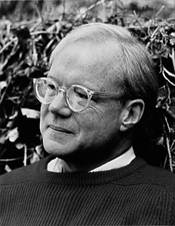
M. Scott Peck, M.D.
May 22, 1936 - September 25, 2005
Scott Peck was a prominent psychiatrist and best selling author. His most noteworthy work was a book entitled “The Road Less Traveled.” In it he makes an extraordinary observation about adversity in the human experience. Under the sub heading Problems and Pain Dr. Peck states:
"Life is difficult.
This is a great truth, one of the greatest truths. It is a great truth because once we truly see this truth, we transcend it. Once we truly know that life is difficult—once we truly understand and accept it—then life is no longer difficult. Because once it is accepted, the fact that life is difficult no longer matters.
Most do not fully see this truth that life is difficult. Instead they moan more or less incessantly, noisily or subtly, about the enormity of their problems, their burdens, and their difficulties as if life were generally easy, as if life should be easy. They voice their belief, noisily or subtly that their difficulties represent a unique kind of affliction that should not be and that has somehow especially been visited upon them, or else upon their families, their tribe, their class, their nation, their race or even their species, and not upon others. I know about this moaning because I have done my share."
Some Godly Perspective
If the Bible tells us nothing else, it proclaims that horrible things can happen to good people. Furthermore, they can happen through no fault on the part of their victims. Consider two examples: each involves speaking truth to power. One ended with God’s intervention and deliverance, the other with God allowing it to play out in a way that resulted in a violent death. However, both involved great champions of faith and how they dealt with very unpleasant circumstances. The first example involved John the Baptist.
Example I
John the Baptist
John the Baptist is one of the most remarkable servants of God to ever live. Jesus once characterized him this way:
Matthew 11:11
“Of every man born of a woman there has not been a greater than John.”
But how did life reward John for his righteousness? Did he live in comfort and safety? Far from it. As a direct result of him speaking truth to power (he indicted Herod for unlawfully marrying the wife of his brother), he was thrown into prison and ultimately beheaded at the request of a child who had just performed a lascivious dance.
Matthew 14: 3-10
(See also Mark 6: 17-25)
For Herod had laid hold on John, and bound him, and put him in prison for Herodias' sake, his brother Philip's wife. For John said unto him, It is not lawful for thee to have her. And when he would have put him to death, he feared the multitude, because they counted him as a prophet. But when Herod's birthday was kept, the daughter of Herodias danced before them, and pleased Herod. Whereupon he promised with an oath to give her whatsoever she would ask. And she, being before instructed of her mother, said, Give me here John Baptist's head in a charger. And the king was sorry: nevertheless for the oath's sake, and them which sat with him at meat, he commanded it to be given her. And he sent, and beheaded John in the prison.
This certainly doesn’t seem like an end for a man who led such an exemplary life. It certainly couldn’t be regarded as fair by any standard. But that was John’s fate. And although the Bible doesn’t say how he reacted as he was being dragged out of his cell to be executed, I suspect that he wasn’t cursing his God or his circumstance.
This now brings us to our second example. It involves three ancient champions of faith and their confrontation with the most powerful man in the word. During this confrontation they actually acknowledged that they were perfectly aware that God may not intervene to rescue them from the life threatening crisis they faced. However, they also declared that their loyalty to God was not predicated on His protection in this matter. In other words they would accept their fate regardless of how it played out.
Example II
Shadrach, Meshach, and Abednego
The story of Shadrach, Meshach, and Abednego is legendary in scripture. We tell it to our children. But this story is far more than a child’s tale. According to scripture King Nebuchadnezzar of Babylon issued a decree requiring all his subjects to pay homage to an image he had erected. This was to be done when an anthem to the king was played. Failure to comply would result in a horrible death—transgressors would be burned alive. Suffice it to say, Shadrach, Meshach, and Abednego refused to comply.
Their action provoked the king to great anger. In short, he went ballistic. He then summoned these Jewish exiles to appear before him. At this point He offers to give these captives a second chance to obey. However he warns them that there will be no other chances. As you read the account notice the words “we are not careful to answer thee in this matter.” In today’s language it would be rendered, “we don’t even have to think about this one.”
Daniel 3: 13-18
Then Nebuchadnezzar in his rage and fury commanded to bring Shadrach, Meshach, and Abednego. Then they brought these men before the king. Nebuchadnezzar spoke and said unto them, Is it true, O Shadrach, Meshach, and Abednego, do not ye serve my gods, nor worship the golden image which I have set up? Now if ye be ready that at what time ye hear the sound of the cornet, flute, harp, sackbut, psaltery, and dulcimer, and all kinds of music, ye fall down and worship the image which I have made; well: but if ye worship not, ye shall be cast the same hour into the midst of a burning fiery furnace; and who is that God that shall deliver you out of my hands?
Shadrach, Meshach, and Abednego, answered and said to the king, O Nebuchadnezzar, we are not careful to answer thee in this matter. If it be so, our God whom we serve is able to deliver us from the burning fiery furnace, and he will deliver us out of your hand, O king. But if not, be it known unto thee, O king that we will not serve your gods, nor worship the golden image which you have set up.
These men were not deterred by their circumstance which was dire at best. They were fully aware of the peril that lay before them and they accepted it—and in doing so never lost sight that their God was real and his hope was assured. Furthermore, Shadrach, Meshach, and Abednego never attempted to cloak their words in diplomatic language or clever arguments. Their answer to the king was resolute and unwavering. In other words, they didn’t try to improve their position. They were fully prepared to play it as it lay.
It should be no different with us.
Something to Think About
Robert Green Ingersoll, a 19th century politician and ironically an agnostic at best, once said, “The greatest test of courage on earth is to bear defeat without losing heart.” The lesson for us should be obvious. God’s people must never let their circumstances cause them to lose heart. We must never become discouraged or embittered by what God allows to take place in our lives. This does not mean we should look for trouble but rather to be prepared to face it when it comes.
The Second Key
Learn to appreciate the value of
Trials and Adversity.
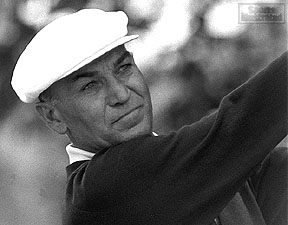
William Ben Hogan
August 13, 1912 – July 25, 1997
Ben Hogan is regarded as one of the greatest players in the history of golf. Nicknamed “The Hawk,” Hogan possessed fierce determination and an iron will. His work ethic was unmatched and he prepared for tournaments like no other. When asked how he could consistently beat the greatest players in the world Hogan replied. “If you can’t out play them, outwork them.”
Hogan was so focused that he rarely spoke during matches and it was once reported that while waiting on the 1st tee, Hogan walked up to the player he'd been paired with the day before. "I'm sorry I didn't speak to you yesterday", he said. "But just so you're not surprised, I won't be saying anything today either."
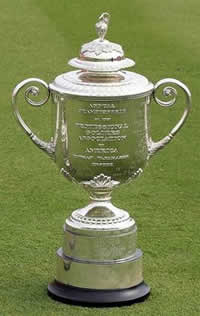
The Wanamaker Trophy
Awarded to the winner of the PGA championship.
It is 28 inches tall and weighs 27 pounds.
Ben Hogan won two PGA titles
During his career Hogan won 63 tournaments including nine majors (the British Open, the Masters, the United States Open, and the PGA Championship). He is one of only four players in history to have won all four of them. However, while in the prime of his career Hogan’s life would take a dramatic turn.
Tragedy Strikes
On February 2, 1949 Hogan and his wife Valerie were involved in a devastating head on collision with a Greyhound bus. Just before impact He threw himself across her in order to protect her. As it turned out that move saved his life. The impact was so severe that the steering column in his car actually punctured the driver’s seat.
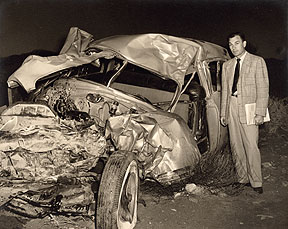
Although he escaped death Hogan was severely injured leading doctors to doubt whether he would ever walk again, let alone play golf. As a result of the accident Hogan suffered a double fracture of his pelvis, a fractured collar bone, a fractured left ankle, two crushed legs, a chipped rib and near fatal blood clots. While in the hospital the blood clots became so severe they required doctors to tie off the vena cava (a large vein that carries de-oxygenated blood from the lower half of the body into the right atrium of the heart.
Hogan remained in the hospital for 59 days. Upon his release he underwent intense self-imposed physical therapy.
The Comeback
The injury that nearly took Hogan’s life made him even more determined to excel. As a result the impossible became possible, then probable. Then less than a year after his accident the “Hawk” resumed his career. However, little did anyone know that four years later (1953) would be the greatest year of his professional career. He won five of the six tournaments he entered including three majors. The great tragedy that literally struck Hogan head-on inspired an even greater level of determination and focus in him. His adversity actual became a platform for triumph. When asked how he drove himself to make such a remarkable comeback Hogan said, "I couldn't imagine myself not playing golf." Imagine if God's people had that kind of determination when seeking the Kingdom.
The Joy of Adversity
When writing to the scattered tribes of Israel James, the half-brother of the Messiah wrote, “My brethren, count it all joy when you fall into divers temptations/trials (James 1: 1-2). But why should anyone find trials a source of joy? The answer to this question is really quite simple. Trials have value because they have the potential to make us better. In reality, the challenges that are so much a part of our lives push against us. And much like a weight whose resistance builds muscle, trials build something far more enduring. They build character and virtue. Furthermore, trials train God’s people in the skill of overcoming--a skill whose value is infinite. Consider the value Christ Himself placed on it.
Revelation 3:21
To him that OVERCOMES will I grant to sit with me in my throne, even as I also OVERCAME, and am set down with my Father in his throne.
The point here is that God is not interested in those who run from adversity. He is not looking for escape artists. In other words, God is not interested in those who will move the ball to a more convenient position. With Him the rule is simple:
PLAY IT WHERE IT LIES
It is an undeniable fact that in life we will invariably experience things that seem unfair. These things can come in the form of an unforeseen accident or an overt act of wrongdoing. Whatever the case the scriptures admonish God’s people to accept it and move on. The apostle Paul exhorted the church at Corinth to be willing to suffer wrong (I Cor. 6:7). The apostle Peter took it even further. Using the example of Christ here is how he expressed it.
I Peter 2: 19-23
For this is thankworthy, if a man for conscience toward God endure grief, suffering wrongfully. For what glory is it, if, when ye be buffeted for your faults, ye shall take it patiently? but if, when ye do well, and suffer for it, ye take it patiently, this is acceptable with God. For even hereunto were ye called: because Christ also suffered for us, leaving us an example, that ye should follow his steps: Who did no sin, neither was guile found in his mouth: Who, when he was reviled, reviled not again; when he suffered, he threatened not; but committed himself to him that judges righteously:
The Third Key
Understand that things are not always
what they appear to be.

The Championship Trophy
Awarded to the winner of the United States Open
Several years ago a major motion picture was released about a young high school student who moved to Southern California with his mother. They traveled across the country to get a new start. Unfortunately things didn’t work out as hoped. The young lad became the incessant target of a gang of bullies who also happened to be quite skilled at Karate. They made the new kid's life a nightmare. At one point after being beaten up the young boy discovered that the maintenance man at his apartment also knew Karate. This prompted him to seek out his new found expert for lessons. The maintenance man consents on one condition. His student must do everything he says without question.
The next morning the student is at his new instructor’s home ready for his first lesson. When he arrives his teacher greets him with a bucket, a hose, some sponges, some wax, and some towels. He then instructs his student to wash and wax every car (about eight) on his property. He even gives very specific instructions concerning how the wax is to be applied and removed modeling each stroke ("wax on, wax off"). At this point the teacher leaves to go fishing while his student is left with a mountain of work. This drill is repeated the next day only this time his student is told to paint the fence surrounding his teacher's property on both sides. The day after he is instructed to sand a massive deck on his knees using two small manual hand held sanders.
When the instructor returns home from his third day of relaxation his student is furious. The young man accuses his teacher of using him as a slave and reneging on his agreement to teach him Karate. At this point the teacher asks his student to demonstrate waxing a car (“wax on wax off’). His student is still furious but complies. Then he instructs him to demonstrate painting the fence using the strokes he was taught. Once again the student complies. Finally he asks his pupil to demonstrate sanding the deck using the exact movements he was taught. After demonstrating these movements the student again expresses his outrage because he expected to be taught Karate. At that point the teacher attacks his student using Karate. However, this time his student blocks every blow using the moves he employed while waxing cars, painting fences, and sanding decks. Suffice it to say the young man was stunned. As he stood in dead silence his teacher bowed and said, “See you tomorrow.”
The point to this should be obvious. Sometimes things are not what they appear to be. In the case of the young student the grueling labor he was subjected to was actually preparing him to compete in and win the All Valley Karate Tournament, not to mention put some bullies in their place.
Nothing more graphically illustrates the principle that things aren't always what they seem than the story of Joseph the son of Jacob. It is told in several chapters of the book of Genesis. As a young boy Joseph had the favor of his father in part because he was Rachel's only child. His older brothers became extremely jealous of the attention he received and would eventually plot to kill him. As we follow various points in Joseph's life notice the injustice he was subjected to. Then notice how he ultimately saw the wrong he had suffered.
Plotting Murder
Genesis 37: 19-20
And they [Joseph's brothers] said one to another, Behold, this dreamer cometh. Come now therefore, and let us slay him, and cast him into some pit, and we will say, Some evil beast hath devoured him: and we shall see what will become of his dreams.
Sold into Slavery
Genesis 37: 23-28
And it came to pass, when Joseph was come unto his brethren, that they stripped Joseph out of his coat, his coat of many colors that was on him; And they took him, and cast him into a pit: and the pit was empty, there was no water in it. And they sat down to eat bread: and they lifted up their eyes and looked, and, behold, a company of Ishmaelites came from Gilead with their camels bearing spicery and balm and myrrh, going to carry it down to Egypt.
And Judah said unto his brethren, What profit is it if we slay our brother, and conceal his blood? Come, and let us sell him to the Ishmaelites, and let not our hand be upon him; for he is our brother and our flesh. And his brethren were content. Then there passed by Midianites merchantmen; and they drew and lifted up Joseph out of the pit, and sold Joseph to the Ishmaelites for twenty pieces of silver: and they brought Joseph into Egypt.
Falsely Accused of Rape
Genesis 39: 5-14
And it came to pass from the time that he had made him overseer in his house, and over all that he had, that the LORD blessed the Egyptian's house for Joseph's sake; and the blessing of the LORD was upon all that he had in the house, and in the field. And he left all that he had in Joseph's hand; and he knew not ought he had, save the bread which he did eat. And Joseph was a goodly person, and well favored. And it came to pass after these things, that his master's wife cast her eyes upon Joseph; and she said, Lie with me. But he refused, and said unto his master's wife, Behold, my master wotteth not what is with me in the house, and he hath committed all that he hath to my hand; There is none greater in this house than I; neither hath he kept back any thing from me but thee, because thou art his wife: how then can I do this great wickedness, and sin against God? And it came to pass, as she spake to Joseph day by day, that he hearkened not unto her, to lie by her, or to be with her. And it came to pass about this time, that Joseph went into the house to do his business; and there was none of the men of the house there within. And she caught him by his garment, saying, Lie with me: and he left his garment in her hand, and fled, and got him out. And it came to pass, when she saw that he had left his garment in her hand, and was fled forth, That she called unto the men of her house, and spake unto them, saying, See, he hath brought in an Hebrew unto us to mock us; he came in unto me to lie with me, and I cried with a loud voice:
Cast into prison for a crime he didn’t commit
Gen 39: 16 - 20
And she laid up his garment by her, until his lord came home. And she spake unto him according to these words, saying, The Hebrew servant, which thou hast brought unto us, came in unto me to mock me: And it came to pass, as I lifted up my voice and cried, that he left his garment with me, and fled out. And it came to pass, when his master heard the words of his wife, which she spake unto him, saying, After this manner did thy servant to me; that his wrath was kindled. And Joseph's master took him, and put him into the prison, a place where the king's prisoners were bound: and he was there in the prison
Joseph's Remarkable Observation
Ultimately, Joseph is released from prison and rises in power throughout Egypt, second only to the king. It is then that his brothers appear before him not knowing who this powerful man is. However, Joseph would eventually identify himself causing great fear in his brothers for the wrong they had done so many years before. He then puts his experience in perspective and explains that all that had happened to him was used by God to fulfill His will for Israel.
Genesis 45:3-8
And Joseph said unto his brethren, I am Joseph; doth my father yet live? And his brethren could not answer him; for they were troubled at his presence. And Joseph said unto his brethren, Come near to me, I pray you. And they came near. And he said, I am Joseph your brother, whom ye sold into Egypt. Now therefore be not grieved, nor angry with yourselves, that ye sold me hither: for God did send me before you to preserve life. For these two years hath the famine been in the land: and yet there are five years, in the which there shall neither be earing nor harvest. And God sent me before you to preserve you a posterity in the earth, and to save your lives by a great deliverance. So now it was not you that sent me hither, but God: and he hath made me a father to Pharaoh, and lord of all his house, and a ruler throughout all the land of Egypt.
The story of Joseph is a testimony to God's presence in the life of His children even when things look pretty bleak. The apostle Paul once wrote concerning how God uses adversity to build something eternal. In essence, the trials we suffer in this life are preparing us for positions of great distinction in the world to come.
2 Corinthians 4:17
For our light affliction, which is but for a moment, works for us a far more exceeding and eternal weight of glory; While we look not at the things which are seen, but at the things which are not seen: for the things which are seen are temporal; but the things which are not seen are eternal.
The Fourth Key
Be Grateful for the Blessings you have and not
resentful of the ones you don’t.
Virtually everyone has experienced some bad breaks that were totally beyond their control. It is how we respond that declares who we are and who we wish to be. And whether we believe it or not we do have a choice in how we respond. Furthermore, that choice should never involve self pity. In truth such an attitude is unbecoming of a future leader in God's Kingdom.
Dignity Under Fire

Lou Gehrig
The Iron Horse
June 9, 1903 - June 2, 1941
One of the greatest examples of expressing gratitude in times of a personal crisis was demonstrated by Lou Gehrig. Lou Gehrig is regarded as one of the most talented baseball players of all time. Sportswriter Jim Murray once described him as "Gibraltar in cleats." He played 2,130 consecutive games a feat that earned him the name “the Iron Horse.” It was a record that would stand until just a few years ago.
In 1938 Lou Gehrig was diagnosed with Amyotrophic Lateral Sclerosis. ALS is an incurable and fatal neuromuscular disease characterized by progressive muscle weakness, resulting in paralysis. The disease attacks nerve cells in the brain and spinal cord. And to this day the cause of ALS remains unknown, and no cure exists.
On July 4, 1939, Lou Gehrig said goodbye to baseball before more than 62,000 fans in Yankee Stadium. He fought back tears of overwhelming emotion and began to speak.
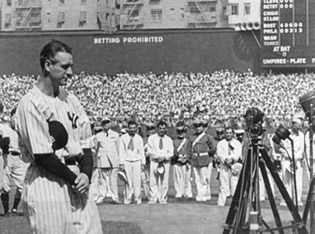
Saying Goodbye
"Fans, for the past two weeks you have been reading about the bad break I got. Yet today I consider myself the luckiest man on the face of this earth. I have been in ballparks for seventeen years and have never received anything but kindness and encouragement from you.
"And Look at these grand men. Which of you wouldn't consider it the highlight of his career just to associate with them for even one day? Who wouldn't consider it an honor to have known Jacob Ruppert? Also, the builder of baseball's greatest empire, Ed Barrow?
"To have spent six years with Miller Huggins? Then to have spent the next nine years with that outstanding leader, that smart student of psychology, the best manager in baseball today, Joe McCarthy?
"When the New York Giants, a team you would give your right arm to beat, and vice versa, sends you a gift - that's something. When everybody down to the groundskeepers and those boys in white coats remember you with trophies - that's something. When you have a wonderful mother-in-law who takes sides with you in squabbles with her own daughter - that's something. When you have a father and a mother who work all their lives so you can have an education and build your body - it's a blessing. And when you have a wife who has been a tower of strength and shown more courage than you dreamed existed - that's the finest I know.
"So I close in saying that I may have had a tough break, but I have had an awful lot to live for."
On June 2, 1941 Lou Gehrig died in the prime of his life.
What Can Be Learned?
Virtually everyone has been on the wrong end of circumstances that boggle our own instincts as well as our understanding of fairness. We have experienced things that simply don’t make sense. Some have lost careers because of office politics. Some have been afflicted with diseases because of genetics. Some have experienced the death of children at the hand of medical mysteries such as SIDS. Some have seen their families destroyed because they chose to honor the law of God and not the traditions of men.
But despite all the calamity, does any of this give any of us the right to curse our lot in life. If you believe the scriptures the answer is NO. Here is how the apostle Peter put it.
I Peter 2:20-23
For what glory is it, if, when ye be buffeted for your faults, ye shall take it patiently? but if, when ye do well, and suffer for it, ye take it patiently, this is acceptable with God. For even hereunto were ye called: because Christ also suffered for us, leaving us an example, that ye should follow his steps: Who did no sin, neither was guile found in his mouth: Who, when he was reviled, reviled not again; when he suffered, he threatened not; but committed himself to him that judges righteously:
A Final Thought:
I would like to conclude with a story. It was told by the late golfing legend Sam Snead about another legend, Bobby Jones.
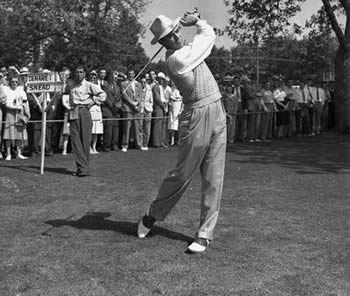
Sam Snead
May 27, 1912-May 23, 2002
Bobby Jones was the greatest golfer of his day and is the only man to win the Grand Slam in the history of the sport. However, Jones was not only a consummately skilled golfer, but he also exemplified the principles of sportsmanship and fair play.
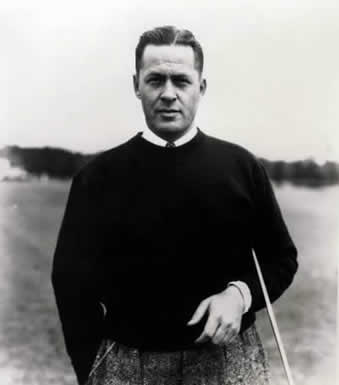
Robert Tyre "Bobby" Jones
March 17, 1902 - December 18, 1971
Early in his amateur career, Jones was in the final playoff of the 1925 U.S. Open at Worcester Country Club. During the match, his ball ended up in the rough just off the fairway, and as he was setting up to play his shot, his iron caused a slight movement of the ball. He immediately got angry with himself, turned to an official and called a penalty on himself.
The officials discussed among themselves and questioned some of the gallery if anyone had seen Jones' ball move. Their decision was that neither they nor anyone else had witnessed any incident, so the decision was left to Jones. Bobby Jones immediately called the two-stroke penalty on himself. He ended out losing the tournament by one shot.
When he was praised for his gesture, Jones replied, "You may as well praise a man for not robbing a bank." Today, the USGA's sportsmanship award is named the "Bob Jones Award" in his honor.
But this is not the story
As Snead tells it, the story goes like this.
"Bobby Jones had a sense of peace, dignity and grace about him that was almost eerie. He was one of the most self composed men I have ever met. Even when his formerly athletic body was ravaged by that awful degenerative disease of the spinal cord, Syringomylia, he was a model of strength, fortitude and dignity.
In 1971, the year he died, Bobby was in his cabin at the Augusta National Golf Club. At that time he was visited by a friend who became distraught by Jones’ condition. The man began to cry and complained how unfair it was for Jones to suffer in such a way. Jones quickly chastised his friend saying, “Now, now. We won’t have any of that. You know the rules. We’re supposed to play our ball as we find it.”
To that I can only say Amen
Respectfully,
Dennis Fischer
P. S. The purpose to all of this is really quite simple and is embodied in three absolute truths. Here they are:.
1) God never promised life would be easy.
2) He never promised life would be fair.
3) But He did promise life would be worth it.
 Print
Print

